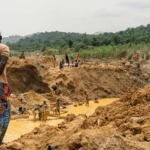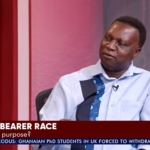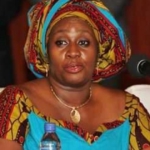
Interior Minister Muntaka Mohammed-Mubarak says he will not recommend a state of emergency to tackle illegal mining (galamsey) despite persistent calls by different entities, with the latest coming from the Catholic Bishops’ Conference.
Speaking on the Joy FM Super Morning Show on Monday, November 17, the minister said the proposal was not practical.
“The Catholic Bishops’ Conference is saying that the President should call for a state of emergency. I mean, as the Minister in charge of internal security, I would not advise that.”
Read also: Declare state of emergency in mining Zones – Ghana Catholic Bishops tell gov’t
“Sometimes we don’t need to lay bare our strengths. To impose curfew in Sawla, Tuna, Kalba, and the area in Bole, we needed to place almost a thousand additional officers to go through on the grounds. To do that in Nkwanta, you needed to put close to 700 additional officers with those who are already there.”
He warned that declaring a state of emergency would force a shift of personnel from across the country.
“If you do that, you say you are going to put a state of emergency. That means we have to withdraw all the security forces from the town to go and enforce it. Do you think that’s practical? I don’t think so.”
He also spoke about ongoing efforts to tackle the illegal mining menace. He revealed that work is reviewed regularly at the highest level.
“This morning, we have a meeting at the Presidency on the galamsey because we meet almost every fortnight to review what we are doing, where we are, whether we are making progress, what the challenges that are coming are, and whether there is something that we can do better.”
“So I can assure you that President Mahama is on top of it, and it’s something that is taken very seriously. He is giving all of us the firm instruction that we must work to bring this matter to a stop.”
The minister called on the public to support security agencies, saying communities often undermine operations.
“The challenge we have, which I want you to be doing, is to appeal to communities. Because you see, if you want to bring down criminal activities, and the communities are not supportive, it makes the work more difficult.”
He added that some residents actively protect offenders, which is hindering the fight. “As we go down, one of the things that is becoming clearer for us is that communities are cooperating with the people. So when you go into the communities behind them, when you even try to seize the equipment, then the community that you are there to protect comes out to support the people, to block the road, etc,” he said.
He urged local leaders to intervene, saying, “I want to appeal to our chiefs, our opinion leaders, our community leaders, and the religious leaders; they should be talking to their communities to be supportive of this fight. Because it makes it very difficult when the community is not supporting.”




